#oil recycling
Text
From Waste to Resource: The Importance of UCO Collection in Sustainable Practices
In a world grappling with environmental challenges, the importance of sustainable practices cannot be overstated. Ecoil is on of the Fastest Growing UCO CollectionUCO Collection Company. Among the many avenues of sustainability, one often overlooked yet incredibly impactful practice is the collection and recycling of used cooking oil (UCO). At Ecoil, we're proud to be at the forefront of this movement, turning waste into a valuable resource through UCO collection and biodiesel production.
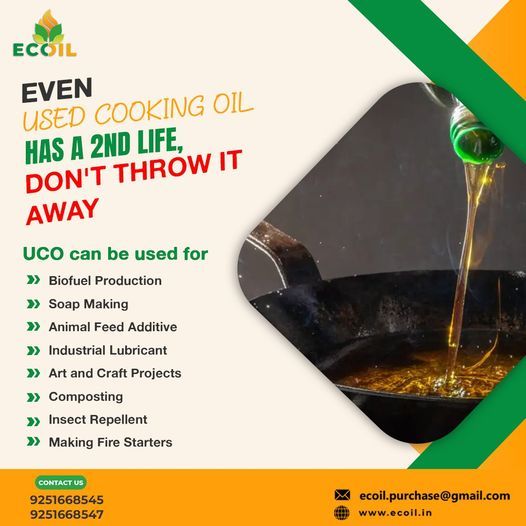
Transforming Waste into Opportunity
Every day, countless gallons of used cooking oil are generated by restaurants, commercial kitchens, and households around the globe. Historically, much of this waste ended up in landfills or was improperly disposed of, posing significant environmental risks such as clogged pipes, water pollution, and soil contamination. However, with the advent of UCO collection initiatives like ours, this waste is being transformed into a valuable resource with a multitude of benefits.
Environmental Benefits of UCO Collection
The environmental benefits of UCO collection are manifold. By diverting used cooking oil from landfills and wastewater systems, we reduce the risk of pollution and alleviate the strain on natural resources. When UCO is improperly disposed of, it can solidify in pipes and sewage systems, leading to blockages and overflows that harm aquatic ecosystems. Additionally, when disposed of in landfills, UCO can release harmful chemicals and greenhouse gases as it decomposes. By collecting UCO and repurposing it into biodiesel, we mitigate these environmental impacts and contribute to a cleaner, healthier planet.
Driving the Circular Economy
UCO collection plays a vital role in fostering a circular economy, where resources are reused, recycled, and repurposed to minimize waste and maximize efficiency. Rather than viewing used cooking oil as a disposable byproduct, we see it as a valuable feedstock for biodiesel production. Through our collection efforts, we're closing the loop, creating a sustainable cycle where waste is transformed into a resource that benefits both the environment and society.
Economic and Social Impacts
Beyond its environmental benefits, UCO collection has significant economic and social impacts. By partnering with restaurants, businesses, and municipalities to collect used cooking oil, we create jobs, support local economies, and generate revenue streams. The biodiesel produced from UCO reduces dependence on fossil fuels, mitigating the volatility of oil prices and enhancing energy security. Moreover, biodiesel production contributes to rural development by providing new markets for agricultural products and bolstering farm incomes.
Joining the Movement
At Ecoil, we're committed to driving positive change through UCO collection and biodiesel production. We believe that every drop of used cooking oil has the potential to make a difference in building a more sustainable future. By joining our UCO collection program, individuals and businesses can contribute to this movement, turning waste into a resource and helping to create a cleaner, greener world for generations to come.
Conclusion
In conclusion, the importance of UCO collection in sustainable practices cannot be overstated. By diverting used cooking oil from landfills, reducing pollution, and producing clean biodiesel, we're not only minimizing environmental impact but also driving economic growth and social progress. Together, let's embrace the power of UCO collectio
0 notes
Photo
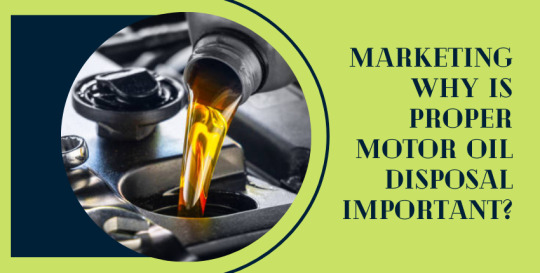
Motor oil is essential to keep your vehicle lubricated. But once the motor oil is used, it gets dirty. This oil is disposed of recklessly and can affect the
environment.
0 notes
Text

Do NOT know why my father made this; however, I can use it. I removed the hinges, rough-sanded most of the surfaces, and got a nice, fragrant* coat of tung oil on it. The smaller piece will become a shallow shadow box lined with a piece of an EXTREMELY old hexagon quilt I was given by an older neighbor. The larger piece


m-i-g-h-t help alleviate the clutter that build up on the night table. Maybe. So I can take "box" off the project list and add "wood painting", because my husband got this piece sanded smooth:

and he would like me to paint this little creek on there.

So I need time to sew, craft, cook, clean, take care of Hero and the pasture, the garden, tutor, paint, and uh . . hmmmm. No, nope, I can definitely do everything. This will work.
.* well I think it smells kind of nice; it's oil from nuts of the tung tree.
#farmblr#diy projects#diy#woodworking#reduce reuse recycle#farm#artists on tumblr#momblr#solarpunk#crafting#upcycle#oil painting#artist
68 notes
·
View notes
Text

#touhou project#tsukasa kudamaki#pk.art#my art#sanae kochiya#oil fire#shamelessly recycling this#she is not polite#get tricked
142 notes
·
View notes
Text
I'm taking a conservation class at the moment and it's like. completely focused on personal waste and water usage. instead of telling us to recycle and take shorter showers, we need to focus on the big stuff. actual effective recycling programs. getting fuel companies to stop shitting on the ecosystem. reducing waste emissions from big industries. don't tell me to ride my bike instead of driving if we can't discuss getting BP to stop dumping oil on marine life. fuckers.
42 notes
·
View notes
Text

The Meeting Place ☁️
#illustration#art#artists on tumblr#traditional illustration#illustrators on tumblr#my artwork#small artist#traditional art#sketchbook#aesthetic#oil pastel#recycled paper#character design#fantasy#creature#creature design
12 notes
·
View notes
Text

Happy earth day to the earth. 🌎🎂🍰
#earth#earth day#earth day 2024#happy earth day#pop art#folk art#poster art#poster design#planets#plastic#plastic free#recycling#recycle#single use plastic#micro plastics#ocean plastic#climate#environmental#environment#environmentalism#enviroment art#oil and gas#fossil fuels#air pollution#water pollution#forever chemicals#pfo#chemicals#healthy living#healthy lifestyle
3 notes
·
View notes
Text
Eco-Friendly Kitchen: Top Tips for Properly Handling and Recycling Used Cooking Oil
Ecoil has emerged as one of the leading used cooking oil collection company used cooking oil collection company, We understands the importance of proper oil handling and recycling. Used cooking oil can be a valuable resource when disposed of correctly, but it can also cause significant environmental damage if poured down drains or dumped improperly.
The Environmental Impact of Improperly Disposing of Used Cooking Oil When dumped down sinks or storm drains, used cooking oil can wreak havoc on municipal sewer systems and natural waterways. As the oil cools and solidifies, it can create blockages in pipes, leading to costly repairs and potential overflows of raw sewage into rivers, lakes, and oceans.
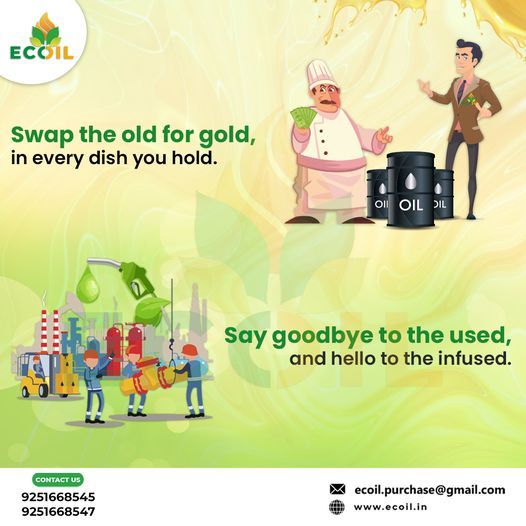
Even small amounts of used cooking oil poured down the drain can accumulate over time, forming hardened deposits known as fatbergs. These solid masses of congealed oil, food waste, and other materials can weigh tons and cause massive disruptions to sewer infrastructure.
Additionally, dumped cooking oil can harm plant and animal life in natural bodies of water. The oil can deplete oxygen levels, disrupt ecosystems, and coat the feathers and fur of wildlife, impairing their ability to stay warm and dry.
Proper Handling and Storage To avoid these environmental hazards, it's essential to follow best practices for handling and storing used cooking oil:
Allow the oil to cool completely before attempting to handle it. Hot oil can cause severe burns and should never be poured down the drain or into the trash.
Strain the used oil through a fine-mesh strainer or cheesecloth to remove any food particles. These particles can lead to rancidity and clogging if left in the oil.
Store the strained oil in a leakproof container, such as the original oil bottle or a sealed plastic jug. Clearly label the container as "Used Cooking Oil" to avoid confusion.
Never mix used cooking oil with other liquids, such as water, solvents, or chemicals. These can contaminate the oil and make it unsuitable for recycling.
Recycling Options Once you've properly stored your used cooking oil, it's time to find a responsible recycling solution. Many options are available, depending on your location and the quantity of oil you need to dispose of:
Locate a used cooking oil recycling facility or collection point in your area. Many municipalities and private companies offer collection services for residential and commercial cooking oil.
If you cannot locate a recycling facility nearby, consider alternative disposal methods, such as solidifying the oil with an absorbent material (like cat litter or sawdust) before disposing of it in the trash.
For larger quantities of used cooking oil from commercial kitchens or restaurants, partner with a reputable used cooking oil collection service like Ecoil. We provide convenient and environmentally responsible oil disposal solutions.
Benefits of Recycling Used Cooking Oil Recycling used cooking oil not only prevents environmental harm but also contributes to a more sustainable future. Recycled cooking oil can be repurposed into a variety of valuable products:
Biodiesel: Used cooking oil is a popular feedstock for producing biodiesel, a clean-burning alternative to traditional diesel fuel. Biodiesel reduces greenhouse gas emissions and can be used in many diesel engines with minimal or no modifications.
Animal Feed: After undergoing a specialized treatment process, recycled cooking oil can be transformed into a high-protein ingredient for animal feed, contributing to the sustainability of the agricultural industry.
Soap and Other Products: Recycled cooking oil can also be used in the production of various household and industrial products, such as soaps, lubricants, and cosmetics.
By recycling your used cooking oil, you're diverting waste from landfills and waterways, reducing your environmental impact, and supporting the circular economy.
Ecoil's Commitment to Responsible Oil Recycling At Ecoil, we're dedicated to providing convenient and environmentally responsible used cooking oil collection services. Our team of experts ensures that all collected oil is handled, transported, and processed according to industry best practices and environmental regulations.
Whether you're a residential household or a large-scale commercial kitchen, Ecoil offers tailored solutions to meet your used cooking oil recycling needs. Our goal is to make the process as seamless and hassle-free as possible, while prioritizing sustainability and environmental stewardship.
Remember, responsible handling and recycling of used cooking oil is essential for protecting our environment and promoting sustainability. Contact Ecoil today to learn more about our used cooking oil collection services and join us in contributing to a greener, more sustainable future.
0 notes
Text
Excerpt:
The petrochemical industry—including major oil companies like ExxonMobil—knew for decades that recycling was not a sustainable solution to the problem of plastic waste, yet continued to promote it in order to avoid regulation and deceive consumers into continuing to buy and use their products, a report released Thursday by the Center for Climate Integrity reveals.
The report, titled The Fraud of Plastic Recycling: How Big Oil and the Plastics Industry Deceived the Public for Decades and Caused the Plastic Waste Crisis, includes newly disclosed industry documents proving that companies and trade groups knew that plastics could not be recycled indefinitely in the 1980s and 90s even as they launched a massive public relations campaign to sell voters and policymakers on the process.
Read more.
4 notes
·
View notes
Photo
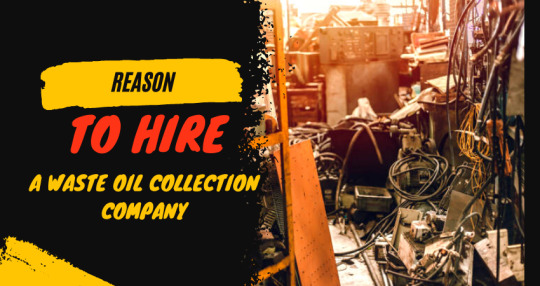
Hiring waste oil collection and recycling services in Bayswater, you can easily save the environment around you from such calamity.
0 notes
Text
Evidence shows fossil fuel companies pushed recycling instead of addressing our growing plastic problem.
. . .
"Through new and existing research, 'The Fraud of Plastic Recycling' shows how Big Oil and the plastics industry have deceptively promoted recycling as a solution to plastic waste management for more than 50 years, despite their long-standing knowledge that plastic recycling is not technically or economically viable at scale," the authors of the report proclaim. "Now it’s time for accountability."
. . .
"In 2017, scientists estimated that just 9% of the 6.3 billion metric tons of plastics produced from about the 1950s (when plastics were first mass produced) up to 2015 had been recycled," Cirino told Salon. "Plastic recycling rates vary widely from region to region around the world. In the U.S., plastic recycling rates are currently below 6 percent."
. . .
"Unfortunately, it doesn’t matter where or how you set out your plastic for recycling collection, whether at the end of your driveway, at your local recycling center, or in a municipal recycling bin: Most plastic items collected as recycling are not actually recycled," Cirino explained. "Surprisingly, plastic is not designed to be recycled — despite industries and governments telling the public that we should recycle plastic."
. . .
Instead the plastics that people think get "recycled" are often instead shipped from the Global North to the Global South, with waste haulers often dumping and openly burning plastic without regard to environmental laws, Cirino explained. People who live near the sites where these things happen face a lifetime of health risks, to say nothing of living in a degraded environment.
. . .
If you want to understand why the general public mistakenly believes that plastic pollution significantly helps the environment, one must look at the same fossil fuel companies that caused the problem.
More at the link.
3 notes
·
View notes
Link
“A Belgian NGO is using human hair clippings to absorb environmental pollutants.
The Hair Recycle Project is led by Belgian non-profit Dung Dung, which develops waste recovery schemes that support a circular economy.
For this project, clippings are collected from hairdressers across the country. The hair is then fed into a machine that turns it into matted squares. These can be used to absorb oil and other hydrocarbons polluting the environment. They can also be made into bio-composite bags.
The mats can be placed in drains to soak up pollution in water before it reaches a river. They can also be used to deal with pollution problems due to flooding and to clean up oil spills.
A single kilogram of hair can absorb seven to eight litres of oil and hydrocarbons.
"Our products are all the more ethical as they are manufactured locally... they are not imported from the other side of the planet," says project co-founder Patrick Janssen. "They are made here to deal with local problems."
How else can human hair be recycled?
While long, healthy locks can be donated to make wigs, shorter hair clippings have a variety of other uses.
Since hair is nitrogen rich, it can be used as a garden fertiliser. Various companies are also experimenting with hair as a building material.
London based biomanufacturing company Biohm is using human hair waste to produce alternatives to wood based sheet material and 3D objects. At this year's London Design Week, Studio Sanne Visser unveiled homeware that incorporated human hair rope.
On its website, the Hair Recycle Project lauds the powerful properties of hair: one strand can support up to 10 million times its own weight. As well as absorbing fat and hydrocarbons, it is water-soluble and highly elastic due to its keratin fibres.
Isabelle Voulkidis, manager of the Helyode salon in Brussels, is one of dozens of hairdressers across the country that pay a small fee to the project to collect their hair cuttings.
"What motivates me, personally, is that I find it a shame hair is nowadays just thrown in the bin, when I know that so much could be done with it," she says.” -via EuroNews, 12/29/22
#hair#science and technology#circular economy#water pollution#oil spill#recycling#hair donation#hair dresser#good news#hope
47 notes
·
View notes
Photo
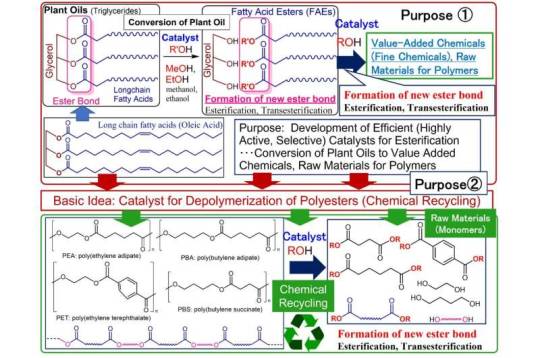
A high-performance catalyst that dissolves polyester and realizes chemical recycling
Professor Kotohiro Nomura's research group at Tokyo Metropolitan University developed two high-performance catalysts for efficient synthesis of value-added chemicals (fine chemicals, monomers) from polyester and vegetable oil. Their major finding is that simply heating a mixture of polyester and alcohol could convert the solution into raw materials. Their research is published in ACS Sustainable Chemistry & Engineering.
Plastic waste is an enormous environmental problem that needs to be solved immediately, but the amount of plastic being reused is still low. Polyesters, which consist of repeated "ester bonds" formed by the reaction of carboxylic acid and alcohol, are used in plastic bottles and clothing. If these ester bonds could be completely severed, polyester could be converted back into its raw materials. However, conventional methods require high temperatures and large amounts of acidic and/or basic materials. Therefore, a simple, inexpensive, and environmentally friendly method is desired.
Nomura's research group developed catalysts to facilitate the synthesis of high value-added chemicals (i.e., fine chemicals) such as the raw materials for polymers, detergents, and cosmetics from inedible vegetable oils, and discovered two types of high-performance catalysts: a calcium oxide catalyst and a titanium catalyst. These catalysts are effective for breaking down polyester based on the same chemical reaction (transesterification) and have been shown to be capable of converting polyester into raw materials with nearly 100% selectivity.
Read more.
46 notes
·
View notes
Text





This is an abstract piece of art I made for my Painting I Class. It’s called “My Rainbow Box”, as I recycled my empty white rags box by priming it with gesso and covered it with oil paint, except for the bottom. I feel that it is important to cut down on waste, and to turn our junk into something worth value.
#oil and gesso on cardboard#abstract sculpture#recycled art#upcycled art#oil painting#environmentally friendly art
2 notes
·
View notes
Text
Poison Ivy unable to reach a handhold on the subway so she just whips out a vine send post
#poison ivy#weird thoughts while commuting#blorbos#also their car runs on recycled oil and it always smells like french fries
3 notes
·
View notes
Text

Pinkie Pie
Oil pastels on recycled paper
17 notes
·
View notes